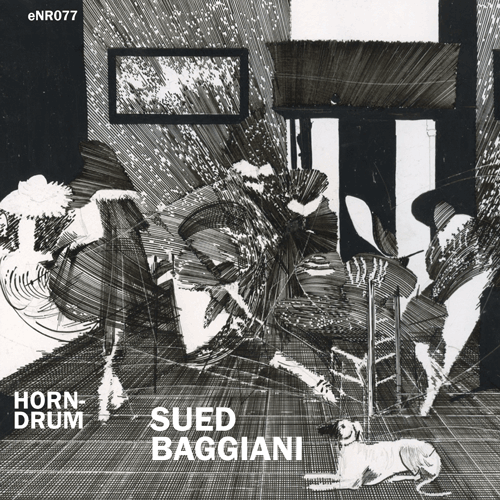
 ☰
☰
![]()

Herman te Loo, Jazzflits nr. 401 (17/07/2023)
Er zijn saxofonisten die heel ritmisch kunnen spelen en drummers die juist weer melodisch zijn aangelegd. De Amsterdamse Argentijnen Natalio Sued (tenorsaxofoon) en Marcos Baggiani (drums) zijn daar uitstekende voorbeelden van. In de loop der jaren zijn ze al in allerlei samenstellingen te horen geweest, maar nu maken ze hun plaatdebuut als duo, met de wat zakelijke naam ‘Horn-Drum’. Maar de muziek op het album is verre van zakelijk. Het tweetal is zo speels als twee kleine jongens die de vrije hand hebben gekregen. En dat levert geestige liedjes op, zoals het haast Rollins-achtige ‘Memorias del futuro’, maar ook een behoedzame bijna-ballad (‘El Misterio de la noche’), een stuk dat aan de bop raakt (‘Bijna song’) en een bluesy eerbetoon aan de ‘heavy tenors’ (‘The Second time you have said never again’). Sued en Baggiani trekken alle klankmogelijkheden van hun instrumenten uit de kast, maar nergens leidt dat tot gefreak of imponeergedrag. Iedere noot, of die nu in samenklank of als ‘call and response’ gespeeld wordt, levert pure muziek op. Dat is ook de conclusie die hoestekstschrijver Oscar Jan Hoogland trekt.
Ken Waxman, Jazzword (23/05/2023)
The Netherlands’ long time reputation for promoting freedom of expression has certainly been confirmed in the field of free music. Not only have local improvisers established themselves internationally, but exploratory musicians from elsewhere have gravitated there as well. So it is with these fine instance of freeform playing from two saxophone-percussion duos. Horn-Drum was recorded in the participants’ Amsterdam home base, but tenor saxophonist/clarinetist Natalio Sued and drummer Marcos Baggiani are both Argentinian. Sued and Baggiani who also work in ensembles with Oscar Jan Hoogland, divide their interactive program into 11 mid-sized tracks.
“Ritual” is the most extended and unique exchange on Horn-Drum. Rather than projecting the widening multiphonics as he does in many other sequences, Sued echoes toneless breaths backwards as Baggiani colors the exposition with intermittent light plops and sympathetic gong-like metal claps. Still any move towards minimalism is scotched before the ending as raucous reed smears confirm hardness as well as harmony. While other tracks may touch on melodic relaxation, it’s rapidity not repose which characterize most of the disc. Taken at march tempo, “Memorias Del Futuro” for instance allows the saxophonist to slide, doit and soar with reed textures both Latin-like and reflecting Sonny Rollins dot-dash stutters. Backed by pitter-patter paradiddles from the drummer, the final section becomes an andante stroll, juddering on high-pitched snare snaps. Baggiani’s ambidextrous pacing also dominates the more technical “Waynu” where the saxophonist emphasizes inner metal vibrations from his instrument in the form of snarls, bites and scoops. On the other hand, “Dialoog” gives full rein to the drummer’s press rolls, rim shots and paradiddles. He creates technical expansion at the same time as maintaining linear flow as Sued’s trills and flutters retreat to the background. Overall with widening and diminishing textures which modulate to project wood, skin and metal drum aspects and every vibration from the reed ranging from gaunt sniffs to breathy snorts exposed, the two connect progressively as they undulate through the selection balancing the straight-ahead and the speculative.
Stripped to essentials of wood, metal, skin and cork, it’s easy to see why so many questing musicians take up this minimalist challenge. Additionally this disc shows exactly what sort of quality sounds can be created in this configuration.